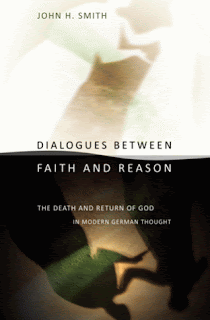De meistbeschimpfter Philosoph komt ook kort aan bod
 Ik vind het wel aardig voor dit blog een passage te citeren uit de recensie van Ben Crowe (van de University of Utah) die vandaag verscheen op Notre Dame Philosophical Reviews [NDPR] van dit boek van
Ik vind het wel aardig voor dit blog een passage te citeren uit de recensie van Ben Crowe (van de University of Utah) die vandaag verscheen op Notre Dame Philosophical Reviews [NDPR] van dit boek van
John H. Smith, Dialogues Between Faith and Reason: The Death and Return of God in Modern German Thought, Cornell University Press, 2011, 309pp., $35.00 (pbk), ISBN 9780801477621.
....
"But, there remain significant gaps in Smith's narrative, gaps that compromise the degree to which he succeeds in conveying the full richness and importance of the German tradition whose story he is telling. In view of Smith's detour outside of the German tradition in Chapter 2 (where he covers Descartes, Spinoza, and Pascal), one wishes that more attention had been given to some of the crucial moments within that tradition. One of these significant gaps involves G.E. Lessing, a figure whom Smith barely discusses in a chapter otherwise dedicated to Kant, but who was probably the most important German religious thinker of the eighteenth century prior to Kant. Lessing's interventions in public discourse, including especially his notorious exchange with Jacobi about Spinoza, were genuine watershed moments that shaped the course of religious thought for at least fifty years. Indeed, Smith barely alludes to the "Spinoza Controversy" of the 1780s, about which nearly every major German intellectual of the period (Jacobi, Mendelssohn, Kant, Herder, Fichte, the Jena Romantics, Hölderlin, Schelling, Hegel, etc.) had quite a lot to say. Smith similarly skips over two other Jacobi-instigated controversies, about Fichte's "atheism" (1798-99) and Schelling's "pantheism" (which came to a head around 1811)." [van NDPR]
Eigenlijk heeft Smith deze kritiek al gepareerd in een voetnoot op pagina 54, note 11: On the impact of Spinoza, via Goethe, on German Idealism, see Smith, "Die Gretchenfraga."
Dat is zijn "Die Gretchenfrage: Goethe and Philosphies of Religion around 1800." In: Goethe Yearbook 18, Camden House, 2011 [Special Section on Goethe and Idealism edited by Elizabeth Millán and John H. Smith - books.google]
John H. Smith is hoogleraar Duits aan de University of California, maar lijkt hier vooral bezig met theologie.
Uit zijn tekst over Spinoza (te lezen bij books.google) blijkt dat zijn kennis van deze filosoof niet uit de eerste hand is. Zo schrijft hij van elders over dat de TTP het enige boek is dat tijdens Spinoza's leven verscheen. Als zo'n fout eenmaal is opgetreden, wordt hij in leven gehouden, ook door hoogeleerden. Uit alles merk je dat deze tekst over Spinoza geschreven is vanuit de kritiek.
De aanduiding van Spinoza als de meistbeschimpfter Philosoph is afkomstig van Hans Küng, zoals door John H. Smith op blz 52 wordt aangehaald.

